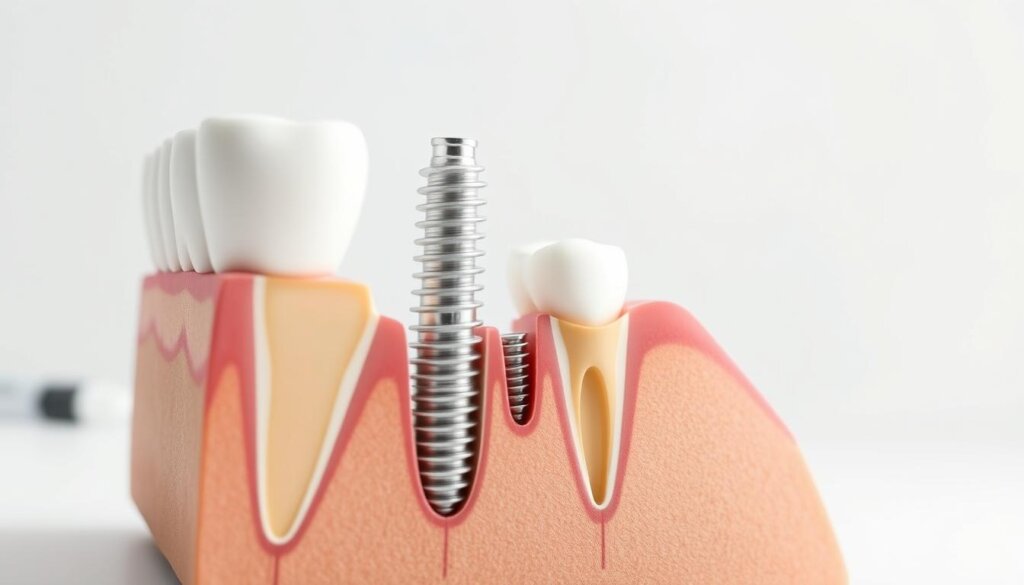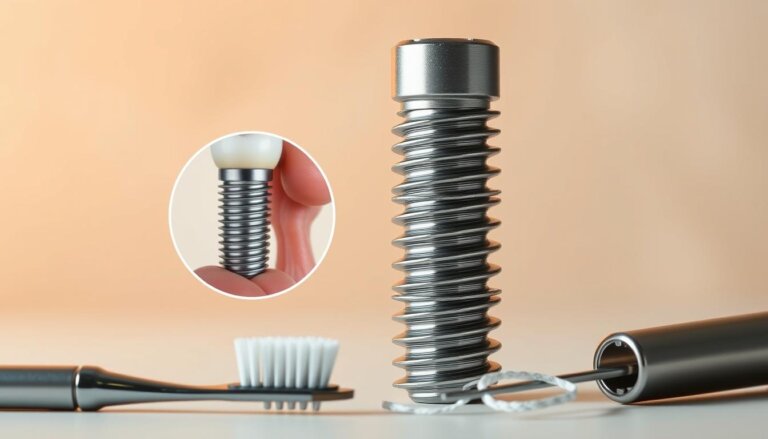How Long Does Implant Surgery Take?
In the United States, over 5 million dental implants are set each year. This shows more people are choosing this advanced dental fix. People often ask: how long does implant surgery take? Knowing the timeline for implant surgery helps manage schedules. It also helps understand the effort and time needed for a successful dental fix.
The journey from the first visit to full healing varies for everyone. It involves several steps, including healing time and bone joining to the implant. This process shows that dental implants do more than just look good. They restore mouth function, improve speaking, and offer a better choice when usual dentures or bridges don’t work.
Key Takeaways
- The dental implant process is tailored to what each patient needs, affecting how long it takes.
- Stages of the surgery include consulting, planning, the actual surgery, and then recovery.
- Factors like oral health and implant type play a big part in surgery time.
- Healing and bone growing are key parts that can extend the process to several months.
- It’s important to pick a surgeon with lots of dental implant experience for the best outcome.
Understanding Dental Implant Surgery
Dental implant surgery provides a way to replace missing teeth. It uses titanium to bond with the jawbone, creating a strong base for fake teeth. This guide highlights key points and how long the surgery takes, helping you know what to expect.
What Is Dental Implant Surgery?
Dental implant surgery replaces lost or damaged teeth with ones that look and work like real teeth. The time it takes varies, based on your dental health, how many implants you need, and any extra steps like bone grafts. These implants attach to your jawbone and act as new tooth roots, making them very sturdy.
Why Are Dental Implants Needed?
Dental implants often come into play due to tooth loss from decay, gum disease, or accidents. They offer a lasting foundation for new teeth that blend in with your natural ones. Plus, they keep your face shape intact by preventing bone loss. Advances in dental tech have made getting implants quicker, bringing back smiles faster.
By understanding the process and benefits of dental implants, patients and doctors can get ready for a successful outcome that boosts oral health and happiness.
The Procedure Breakdown
The path to getting a dental implant is made up of several key steps. Each one is crucial for the implant’s success and duration of the dental implant procedure. Knowing about these steps is important, as the implant surgery duration factors can change a lot from one person to another.
Step 1: Initial Consultation
The very first meeting is vital for the whole implant process. Here, the dental team checks your oral health through exams, X-rays, or maybe 3D scans. This helps make a treatment plan just for you. It also helps figure out how complex the surgery will be and guess how long the duration of the dental implant procedure might be.
Step 2: Imaging and Planning
After the first meeting, there’s a lot of planning. The team uses advanced imaging to make a surgical guide. This guide is key for placing the implant exactly right. Good planning can make the surgery quicker and smoother, affecting the implant surgery duration factors.
Step 3: Surgery Day
Surgery day is when the implant gets put in place. Sometimes, teeth have to be taken out or bone grafting done before putting in the implant. Each step needs to be done carefully since it impacts the duration of the dental implant procedure. After the implant is in, it takes time to heal before the final part of the implant is added.
Knowing every step in detail helps patients know what to expect. It also sheds light on the different implant surgery duration factors. This way, patients can prepare better for the process.
Duration of Each Step
Getting a dental implant involves several steps. Each one has its own timeframe for the best outcomes and safety. It’s important for patients and doctors to know how long each step takes. This helps with planning and setting the right expectations.
Explanation of Initial Consultation Timing: The first meeting with the dentist is very important. During this time, which lasts 30 to 60 minutes, the dentist checks your mouth’s health. They also talk about how they will put in the implant. This step is key to make sure your implant fits well.
Average Time for Imaging and Planning: After meeting the dentist, they will take detailed images of your jaw. This may include X-rays or CT scans. These images help plan where to place the implant. This stage usually takes a few days as the dentist makes a surgery plan just for you.
Surgical Procedure Duration: Putting in the implant takes 1 to 2 hours for each one. The exact time can change based on how many implants you need. It also depends on the health of your teeth and jaw.
- Consultation and Planning – Up to 1 hour
- Imaging and Preparatory Work – A few days, including analysis
- Surgical Implantation – 1-2 hours per implant
Knowing how long do dental implants take to place matters for patients and doctors. Good planning makes sure the implant lasts a long time. That’s why it’s important to focus on each step.
Factors Influencing Surgery Duration
It’s vital for patients and doctors to know what impacts how long does implant surgery take. Many factors can change how long dental implants take. Let’s look at the main ones:
Patient’s Oral Health
The condition of a patient’s mouth plays a big role in surgery time. Good oral health and strong bones mean surgery might be quicker. But, issues like gum disease or not enough bone could mean needing extra steps, like bone grafts. This can make implant surgery duration factors longer.
Type of Implant Used
The kind of implant makes a difference too. Older implant designs may take longer to put in than modern ones. New implants, like mini ones or those for immediate use, might be quicker to install.
Number of Implants Placed
How many implants placed matters a lot. One implant won’t take as long as doing a whole mouth full. The more implants needed, the longer the surgery will take.
| Condition | Single Implant Duration | Multiple Implants Duration |
|---|---|---|
| Good Oral Health | 1 hour | 3-4 hours |
| Average Oral Health | 1-2 hours | 4-6 hours |
| Poor Oral Health | 2-3 hours | 6+ hours |
All these factors help figure out how long does implant surgery take. Dentists can then estimate surgery time better and set the right expectations for patients.
Recovery Timeline
Recovering from dental implant surgery happens in stages: right after surgery, the short-term phase, and the long-term healing. Knowing what to expect in each phase helps patients be ready. It also helps make sure the implants last a long time.
Immediate Aftercare
Right after surgery, the main goals are to control swelling, ease pain, and prevent infection. This involves using ice packs, taking painkillers as prescribed, and keeping the mouth clean with special mouthwashes. Eating soft foods and avoiding anything hard, spicy, or very hot is important too.
Short-Term Recovery
In the days and weeks after surgery, patients enter the short-term recovery phase. This time can vary, lasting a few weeks to a couple of months, depending on the person. Patients see their dentist for check-ups to watch how the implant is settling in. They might also get stitches taken out. Eating normally again and keeping the mouth clean are key tasks during this stage.
Long-Term Healing Process
The last part of recovery is when the implant bonds with the jawbone, called osseointegration. This can take several months. Patients should avoid hard foods or smoking to protect the implant. Regular visits to the dentist are important to make sure everything is going well. These check-ups help catch any issues early, helping the dental implant last a long time.
Anesthesia and Its Impact on Surgery Time
Understanding how anesthesia affects implant surgery offers insights into the implant surgery time frame. It’s key for managing pain and anxiety. This management impacts how long and how well the procedure goes.
Different surgeries and patient needs mean the choice of anesthesia varies. These choices influence the surgery and recovery time.
Types of Anesthesia Used
- Local Anesthesia: Typically used for simple, minor operations. It numbs the area around the dental site.
- Sedation: Used for reducing patient anxiety and discomfort. Depending on the sedation level, it can range from mild, where the patient is relaxed but awake, to deep sedation.
- General Anesthesia: Used in more complex cases where the patient needs to be completely unconscious. This is often reserved for extensive surgical procedures or for patients who are particularly anxious.
Effect of Anesthesia on Procedure Duration
The type and how anesthesia is given greatly affects the implant surgery time frame. With local anesthesia, patients can often get back to daily life fast. But, general anesthesia may mean a longer recovery. This type needs more time for observation afterward.
So, the anesthesia impact on implant surgery is something to really think about. Picking the right kind of anesthesia helps keep the patient safe and comfortable. It also makes the surgery go more smoothly. Knowing this helps doctors and patients prepare better for implant surgery.
Possible Complications and Their Effects
Though most dental implant surgeries go smoothly, knowing about possible complications is key for full readiness. These issues can impact the dental implant surgery length as they might need more procedures.
Some common problems include infection at the implant spot, sinus trouble, nerve damage, and harm to the mouth area. These problems require quick medical care. They also increase the implant surgery duration factors, making the treatment longer.
How Complications Extend Surgery Time
Even though complications are uncommon, handling them right is important. For example, an infection could make you need more surgery, like taking out the implant, treating the infection, and putting in a new implant after you heal. This clearly makes the dental implant surgery length a lot longer.
| Complication | Additional Procedures Required | Added Surgery Time |
|---|---|---|
| Infection | Implant Removal, Antibiotic Treatment, Re-implantation | Several weeks to months |
| Sinus Issues | Sinus Lift or Modification | 1-2 Hours |
| Nerve Damage | Neurological Consultation, Potential Repair Surgery | Variable, case-dependent |
| Injury to Oral Structures | Corrective Surgery, Possible Rehabilitation | Additional hours to weeks |
Lifestyle choices like smoking can also worsen complications, impacting the implant surgery duration factors. It’s important for patients to share their full health details with their surgical team. This helps lower risks and plans better for any issues that might pop up during treatment.
Patient Preparation for Surgery
Getting ready for implant surgery is key to a successful and efficient operation. Knowing how to prepare can also affect how long dental implants take to install. This shows why knowing what to do before surgery is so important.
Before the surgery, patients get detailed instructions. These steps are crucial for a smooth procedure and to avoid delays. Following these steps helps achieve the best results and reduces risks.
- Comprehensive cleaning regimen to avoid infections.
- Instructions on fasting if sedation or anesthesia is to be used.
- Arrangements for post-surgery transportation and care.
- Avoidance of certain medications or supplements that could affect surgical outcomes.
Being well-prepared is vital. It ensures the dental implant process starts on time. This avoids any unnecessary hold-ups, impacting how long dental implants take to install.
Post-Operative Care
After dental implant surgery, good post-operative care is key for healing and implant success. It’s important not just for quick recovery but also affects the implants’ long-term health.
The recovery instructions are simple but very important. Patients should eat soft foods to reduce strain on the new implants. Keeping the mouth clean by gently brushing and using prescribed mouthwashes also helps in preventing infections. This ensures the implants last a long time.
Patients need to watch out for any signs of trouble after their surgery. Persistent pain, more swelling, or signs of infection should be taken seriously. If seen, patients must contact their dental surgeon quickly. These symptoms could mean complications that might impact how long the implants last and how well they work.
- Eat soft foods to avoid pressure on implants
- Follow strict oral hygiene routines
- Monitor for signs of swelling, pain, or infection
- Regular dental checkups to assess implant health
Post-operative care for dental implants is not just about healing. It’s also about making sure the implants work well and blend in with your natural teeth. Paying attention to care instructions from the dentist can really help with the healing process and the success of the dental implants.
Alternatives to Dental Implants
When looking into replacing a missing tooth, it’s key to know about different choices beyond dental implants. While implants are known for their lasting service and function, they’re not suited for everyone. This fact makes it important to consider other good options.
Dentures and bridges are the main alternatives. Dentures, which you can take out, are made and fitted faster than implants. Yet, they might not be as stable or keep your jaw healthy in the long run. Bridges, on the other hand, need the teeth next to them to be shaped to hold the bridge. This method offers a fix that stays in place but, like dentures, doesn’t help keep your jaw bone healthy as implants do.
Dentures can be ready and in place in just a few weeks, providing a quick fix for missing teeth. Getting a bridge might take more visits to your dentist, from a few weeks to months, depending on how complex your case is.
For more insights on these options and how soon you can get them, check out composite fillings solutions. This site also talks about faster ways to fix your teeth.
Each choice meets different needs and likes, from dentures that are quick and cost less, to bridges that feel and work more like real teeth. Talk well with your dentist to find out which option matches your personal and health needs the best.
Choosing the Right Surgeon
The surgeon’s skill greatly influences the success of dental implant surgery. A skilled surgeon can make the procedure smoother and increase success chances. So, it’s key to pick a choosing a dental implant surgeon who is both qualified and experienced.
Looking at potential surgeons, consider their training and real-world skills. The combination of scientific understanding and surgical expertise is crucial for successful implants. Here’s what to pay attention to:
Qualifications to Look For
- Board certification in oral and maxillofacial surgery or periodontics
- Advanced training specifically focused on implantology
- Licensure and accreditation by respected medical boards
- Continuous education through seminars and workshops in dental implant technology
Importance of Experience in Implant Surgery
An experienced implant surgeon has a track of successful surgeries, not just many surgeries. A good track record shows the surgeon can handle complex problems and unexpected issues well. So, looking closely at their past work, how often they’ve done procedures, and patient feedback is useful.
In the end, the skills and track record of your surgeon are fundamental to your dental implant process. Choosing an experienced implant surgeon with solid qualifications ensures they can meet your needs. This decision is a crucial step in your journey towards dental health.
FAQs About Implant Surgery Timing
People getting dental implants often want clear info on the surgery’s timeline and steps. Talking about FAQs about the dental implant timeline makes the process clearer. It also helps set the right expectations by providing answers to implant surgery questions.
Let’s dive into common questions about dental implant procedures. This includes the prep work, the surgery itself, and recovery.
| Question | Answer |
|---|---|
| How long does the initial consultation typically take? | The initial consultation may last between 30 to 60 minutes, during which a comprehensive dental assessment is done. |
| What is the duration of the imaging and planning phase? | This phase can vary widely, usually taking from a few days up to a couple of weeks, depending on the complexity of the case and the technology used. |
| How long is the actual implant surgery? | The surgery itself generally takes 1 to 2 hours per implant, although this can extend based on the number of implants and the need for additional procedures like bone grafting. |
| What should I expect during recovery and healing? | Initial healing typically takes about 2 to 6 months, during which the implants integrate with the bone, a process known as osseointegration. |
| Can the timeline vary between patients? | Absolutely, factors such as bone density, overall oral health, and individual healing capacity can influence the duration significantly. |
Knowing the timeline of implant surgery helps manage our expectations. It also gets us ready for surgery and the healing that follows.
Conclusion
Getting dental implants involves many careful steps. These steps help bring back your smile and the way you chew. The time it takes isn’t the same for everyone. It usually takes months, starting from your first dentist visit to when the implants are fully set. This time includes a healing phase where the implant bonds with your jawbone, essential for success.
Every step of the implant process is important. From getting ready for surgery, to the surgery itself, and then healing and taking care of your teeth. Success comes from these steps working together and the skill of your dentist. Patients need to stay in touch with their dentist and be ready for the journey.
In the end, getting dental implants is about learning, precise dental work, and looking after your teeth well after the surgery. If you’re thinking about this procedure, find a skilled dentist and learn all you can. Knowing what to expect helps you get the best results, improving your life with dental implants.




